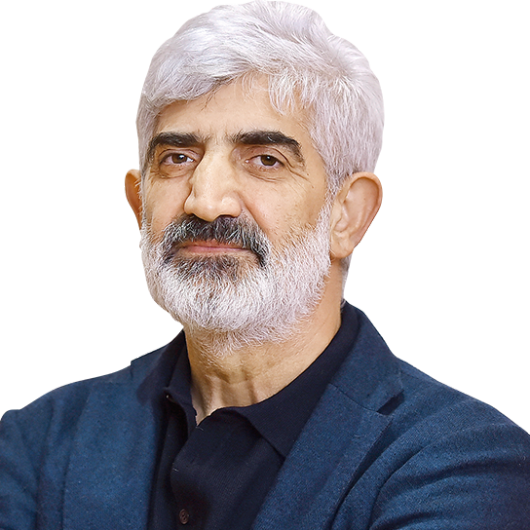
- 15.01.2025, Çarşamba
- 11:11
Farewell to humanity...
00:2123/06/2024, Pazar
Next article
İhsan Aktaş

We've been accustomed to a tragic pattern since our childhood every holiday: Israeli soldiers either raid Al-Aqsa Mosque, desecrating its sanctity with their boots, or create disturbances around it, violently oppressing Muslims. In the Muslim world, responses are vague, the issue fades away, and in Palestine, daily life continues with Palestinians slowly dying in the city, countryside, village, and fields. The world has witnessed the slow demise of Palestinians for 75 years. Today in Gaza, Palestinians
We've been accustomed to a tragic pattern since our childhood every holiday: Israeli soldiers either raid Al-Aqsa Mosque, desecrating its sanctity with their boots, or create disturbances around it, violently oppressing Muslims. In the Muslim world, responses are vague, the issue fades away, and in Palestine, daily life continues with Palestinians slowly dying in the city, countryside, village, and fields.
The world has witnessed the slow demise of Palestinians for 75 years. Today in Gaza, Palestinians are dying en masse. The level of oppression and cruelty is so immense that it defies the definition of genocide and is unbearable for the human body.
Famous Beirut writer Amin Maalouf, in his book "The Disintegration of Civilizations," refers to the 1967 Arab-Israeli war, highlighting how the Arab nationalism fostered by Nasser created a sense of Arab pride. "The defeat of Arab countries in the war shattered Arab pride. This sense of defeat and humiliation became a permanent syndrome in Arab countries," he says.
Today, a handful of faithful Palestinian patriots are writing a heroic epic capable of restoring the lost Arab pride despite the immense suffering. However, it’s uncertain whether there are still Arabs around to witness it.
In the 1970s, oil wealth was significant among the world's riches. Technological and developmental advances and population densities brought countries like Türkiye, Pakistan, Iran, Malaysia, Indonesia, and Egypt to the forefront. Oil-rich Arab countries lagged far behind in terms of global influence. Apart from energy, they have little impact on international relations. Western states have effectively downgraded many Arab countries from nation status for various reasons. Consequently, their people have become increasingly passive under the influence of semi-colonial states.
In Türkiye, the government is active, but civil society is dormant. When there is oppression, injustice, or a violation of rights anywhere in the world, it is typically civil society that first protests and calls on governments to adopt proper policies. In the U.S., particularly in universities, and across Europe, protest waves have been remarkably successful. It’s beyond mere observation that Israel has lost the communication war. This situation has even rekindled some latent anti-Semitic sentiments in the West.
Civil society organizations in Türkiye are unaware of their leadership position in the Islamic world, the Turkic world, Africa, and the Balkans. Until the Özal era, Türkiye was a closed society. Certain intellectual movements related to Islam developed earlier in other countries, and at one point, some ideas were imported from Egypt, Lebanon, and Iran through translated books. The depth and civilization heritage of these lands, coupled with Türkiye's accumulated knowledge, democratic climate, and human development, have shown that Türkiye is more advanced in intellectual richness than the external world.
While Erdoğan reflects his status as a region's political leader and a globally recognized, appreciated, and debated figure, our civil society organizations act like Ugandan NGOs.
A significant part of the war is waged in the communication field. To create an impact, it's not always necessary to gather a million people in squares; sometimes, a single act, a symbol, or small efforts can resonate globally.
Let our stance be clear: At the start of the war, we initiated a registry under the record initiative. For a month, it continued with academics, law, photography, cartoons, seminars, and live broadcasts. Many NGOs are organizing various activities, but to create a global impact, action plans must be coordinated with universities, demonstrators, academic and activist celebrities worldwide.
1. A human rights court could be established in Sultanahmet Square, bringing together famous activists, prominent lawyers, and students protesting Israel from universities to parliamentarians speaking in the EU, for a global event. Israel's violations can be tried one by one.
2. An index of war days could be created. Discussions on the attitudes of states, parliaments, universities, and the media from the first day of the genocide until now could be held, with seminars, academic records, and digital visual archives established.
3. Collective memory: Prominent figures from around the world could gather in world capitals to make joint statements.
4. An action content workshop could be organized. With hundreds of thousands of smart students in our universities, unimaginable diverse actions could be conceived, possibly creating contents that resonate with the youth of the new world, who knows?
Today, civil society organizations in Türkiye are not structures organized in the suburbs for seeking rights but have accumulated significant experience over 40 years. The only problem is their unawareness of their leadership positions. If they have issues grasping the spirit of the new world due to predominantly elderly representation, this country has a young population. They should listen to the vibrant youth or proudly pass on their seats to them; they understand the spirit of the times better.
This war will end one day, and this pain will pass. Let's not endure the agony of helplessness for a lifetime for the sake of humanity. Each of us should take small steps and see what God does.
#Gaza
#Palestine
#Humanity
#Israel
#Türkiye
#Muslims
LEGAL NOTICE
The BIST name and logo are protected under the "Protected Trademark Certificate" and cannot be used, quoted, or altered without permission.All rights to the information disclosed under the BIST name are entirely owned by BIST and cannot be republished. Market data is provided by iDealdata Financial Technologies Inc. BIST stock data is delayed by 15 minutes.
